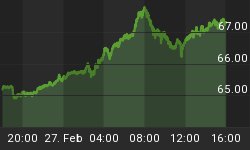... Brazil Steps Up Real Intervention; Root Cause of Crisis
It's hard not to laugh at the irony of recent central bank currency actions.
-
After complaining for years about the strength of the Real, the Brazilian central bank stepped up intervention actions hoping to stop a plunge in the currency.
-
Turkey now attempts to attract capital after taking measures for the past four years to stop the flow of money into the country.
-
In India, the central bank seeks to stop a plunge in the Rupee which is at a record low of 58.95 to the dollar.
The Wall Street Journal reports Emerging-Market Currencies See Turnaround After Hefty Losses
The South African rand and other emerging-market currencies reversed course to gain against the dollar Tuesday after suffering heavy losses earlier in the session.These currencies have plummeted rapidly in June, dragged down by expectations the Federal Reserve will taper its bond-buying program later this year. Ultra-accommodative U.S. monetary policy had helped drive investors to seek higher yields in emerging markets in recent years, analysts say.
India's central bank dove into foreign exchange markets Tuesday to stop the rupee's slide at a record low of INR58.95 to the dollar. Pressured to attract capital to the country, a top Indian economic official promised a new round of measures to allow foreign investment in currently restricted parts of the economy. The rupee pared losses against the dollar but still fell 0.3% on the day to trade at INR58.34 per dollar.
Turkey's central bank on Tuesday announced new measures to attract capital after spending much of the past four years trying to stop too much money from flooding into its economy. That helped to stem the lira's fall to near a multi-year low against the dollar as police moved in on protesters in Istanbul. Turkey's capital measures echoed Brazil's move earlier this month to eliminate a 6% tax on foreigners' bond investments.
Brazil's central bank stepped up intervention in the face of the rapid currency depreciation that began on May 28, with a series of foreign exchange swap auctions, including two on Tuesday.
Emerging Market Assets Suffer in Fierce Sell-Off
The Financial Times reports Emerging market assets suffer in fierce sell-off.
Emerging market currencies, stocks and bonds suffered a fierce sell-off on Tuesday on rising investor concerns over the prospect of the US Federal Reserve reining in its programme of bond-buying to drive down long-term interest rates.The South African rand and the Brazilian real touched four-year lows against the US dollar on Tuesday, and the Indian rupee fell to a record low. Even relatively robust countries like the Philippines and Mexico - long favourites of investors - have been hit by a spate of selling.
The FTSE Emerging Markets index fell 1.7 per cent on Tuesday, taking its decline since its May peak to more than 10 per cent. Shares in Brazil - one of the four big emerging markets - closed 3 per cent in São Paulo on Tuesday. That pulled Brazilian shares into bear market territory - a drop of more than 20 per cent from a peak this year.
Both international and local currency emerging market bonds have been pummelled, sending borrowing costs higher.
Benoit Anne, a senior strategist at Société Générale, said central bank money had arguably inflated a bubble in emerging markets, which was now unravelling as investors priced in a change in Fed policy. "This will not be a short-lived sell-off," he predicted.
Emerging market fund managers have also been hit by investor redemptions. Asset managers that focus on international bonds last week suffered the biggest investor withdrawal since mid-2007, according to EPFR. Emerging market equity funds were hit with the biggest redemptions since 2011.
Cause of the Selloff
Both the Financial Times and the Wall Street Journal pinned the blame on the possibility the Fed would stop its QE programs later this year.
I rather doubt that is the cause, and I also doubt the Fed is going to stop QE any time soon.
Instead, I propose this is what happens when bubbles burst. And a huge part of numerous bubbles was widespread belief the growth in China and India will last forever. Hot money plowed into emerging market countries and also commodity producing countries.
Australia is another casualty of the coming bust of China. For details please see Australian Dollar Plunges as Home Loans Dive; Australia Insolvencies Hit Record; Worst is Yet to Come.
To be sure insane amounts of liquidity fueled various bubbles in stocks, in bonds, in emerging markets, but with the global economy rapidly slowing, and with much of Europe in an outright economic depression, the Fed is not that likely to curtail QE soon.
If the Fed does slow QE, it will not be because the US economy is strengthening, but rather realization by the Fed (not admitted of course) that various stock and bond market bubbles pose serious economic risks if allowed to grow bigger.
Root Cause of Crisis
By the way, all this extremely volatile currency action, as well as various equity and bond market bubbles, can be pinned entirely on central banks, fractional reserve lending, and lack of a gold standard.















